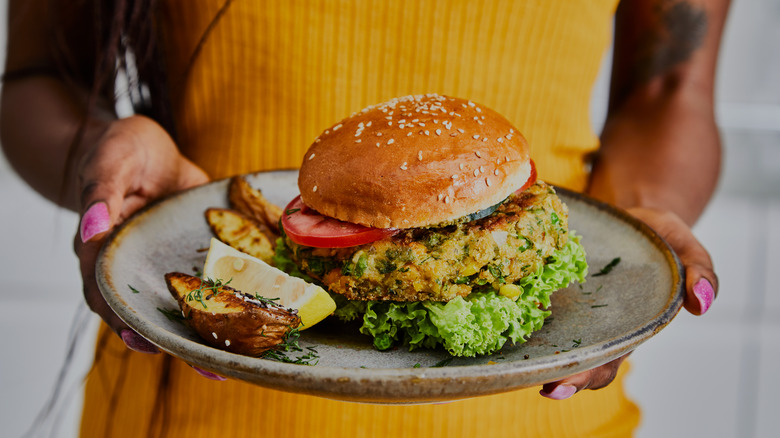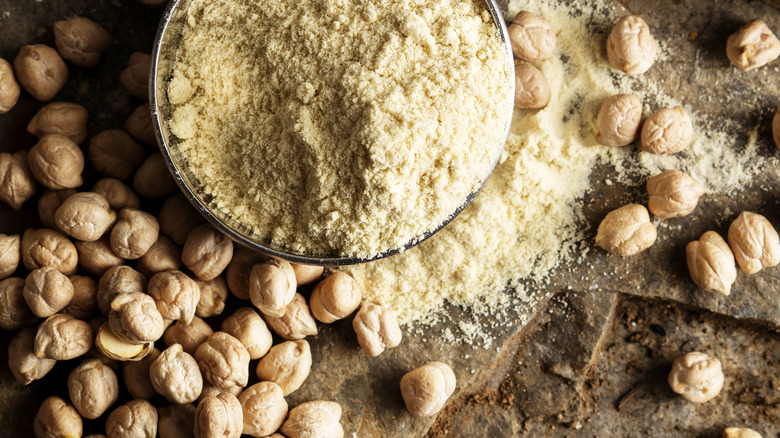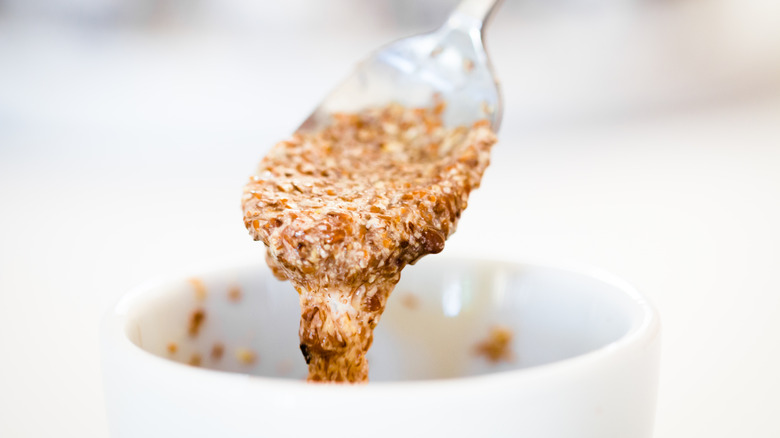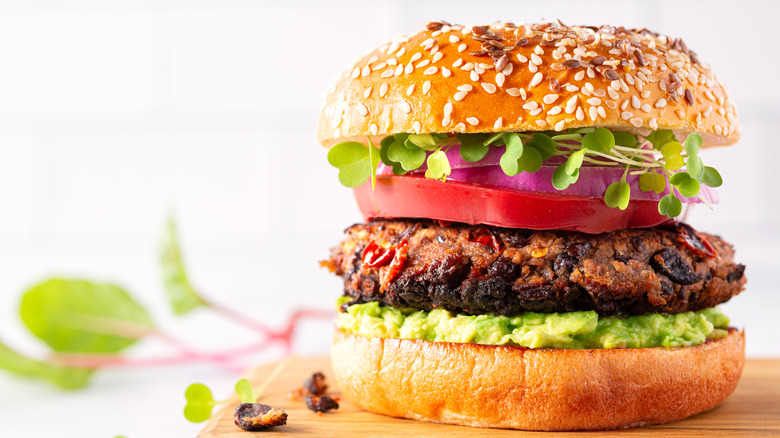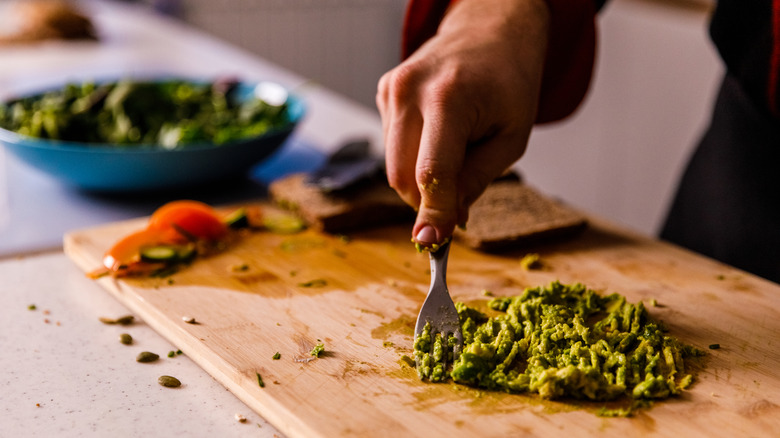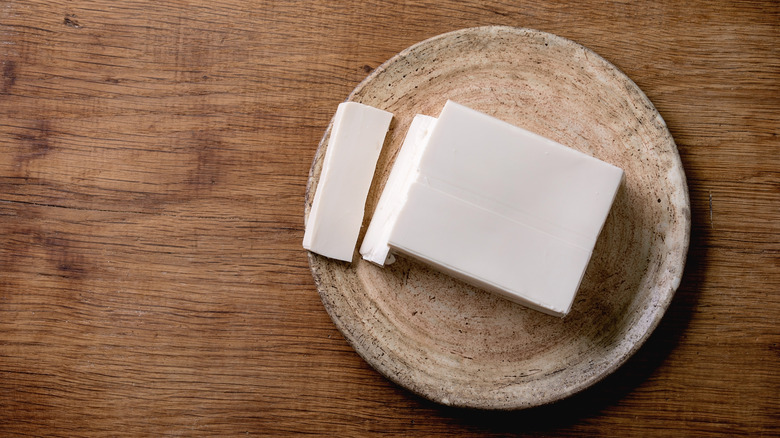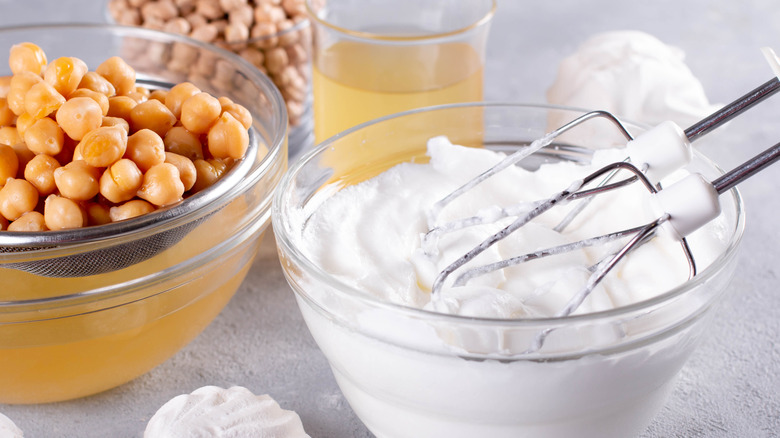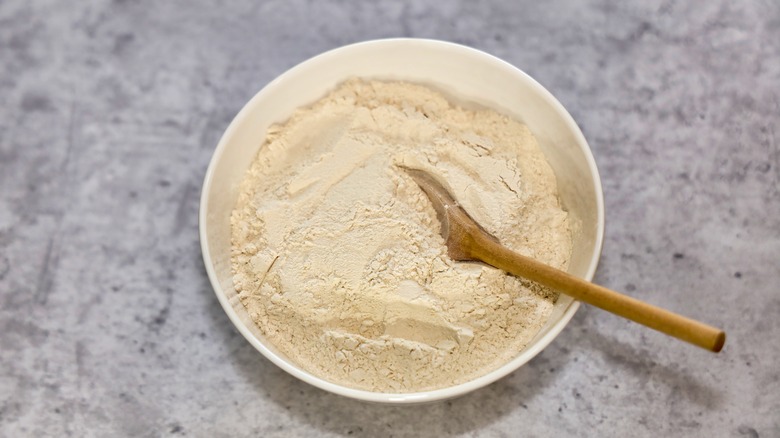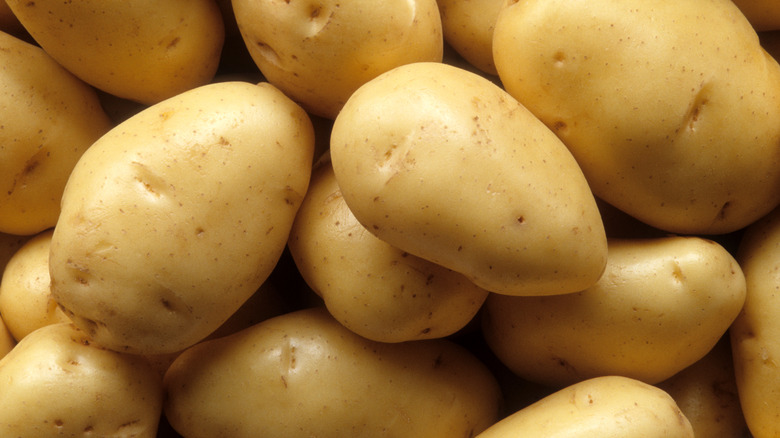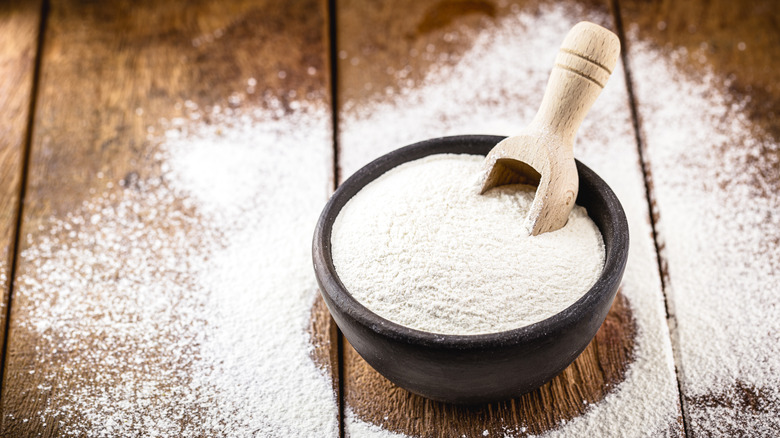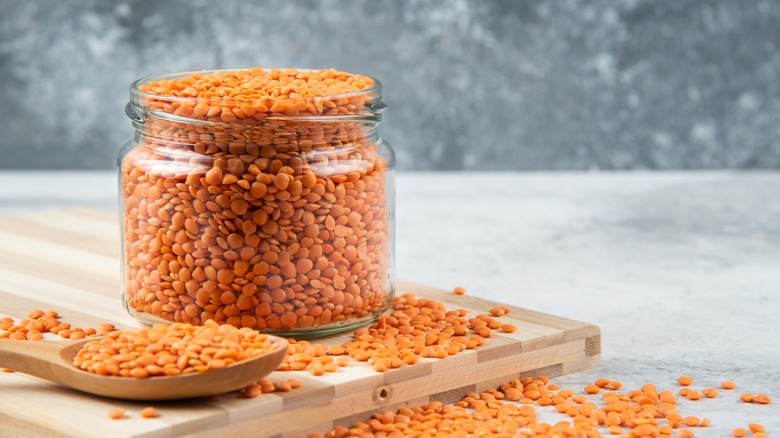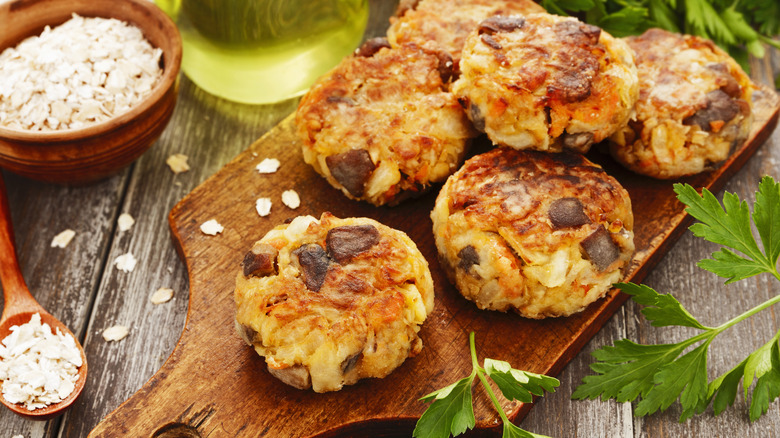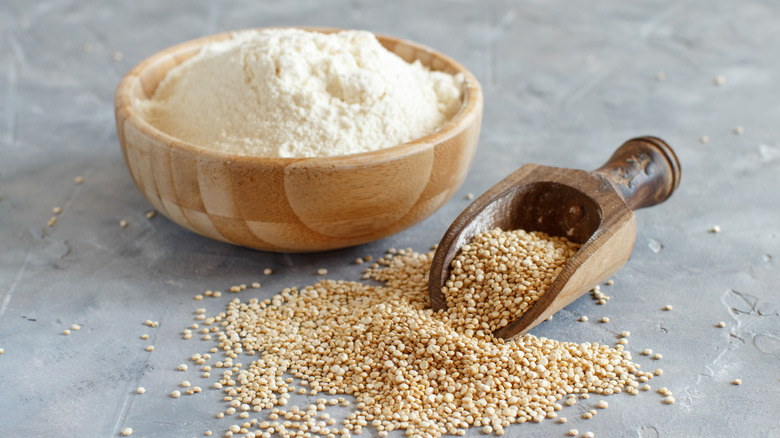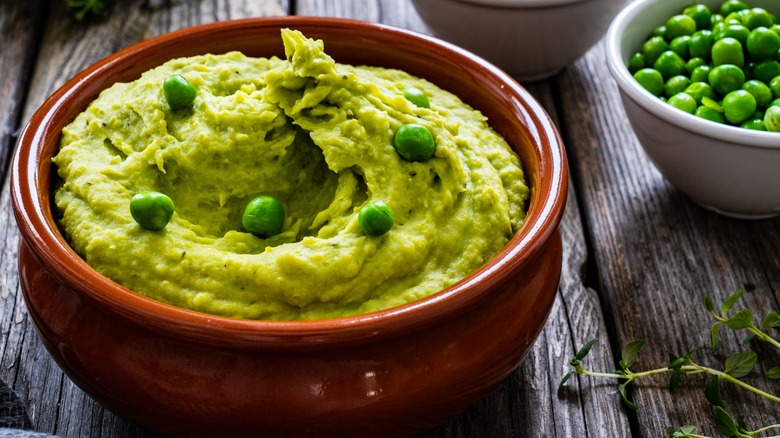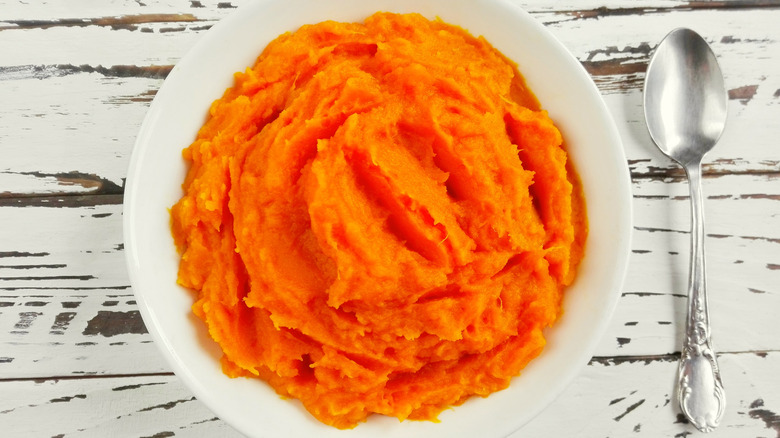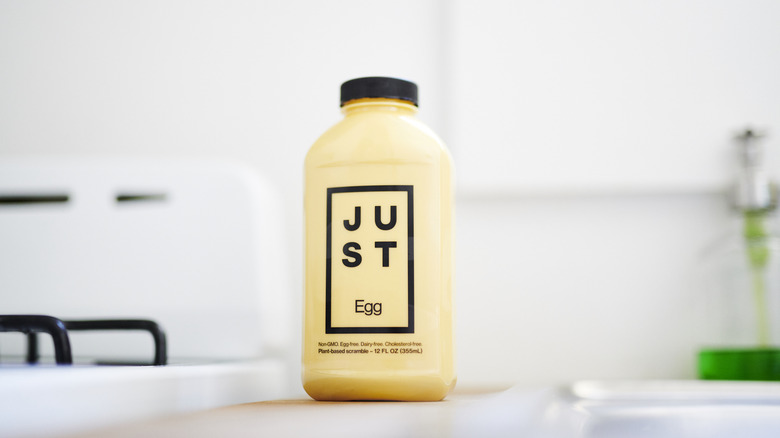15 Best Binders For Vegan Burgers
As more and more people move away from regularly consuming red meat, consumers are desperate for flavorful replacements. And while alternative meat brands like Impossible and Beyond are whipping up vegan substitutes that taste like the real thing, many folks prefer a plant-based alternative made from whole, fresh ingredients that they recognize. Luckily, there are plenty of options on the market for these veggie-packed patties, but there's really nothing like homemade food. While making your own vegetable-based burger may seem like quite a feat to take on, the basic formula is actually quite simple to follow. While it's completely up to the cook which veggies and herbs are going into a vegan burger, one element is absolutely essential. Without a good binder for vegan burgers, they are likely to fall apart, mush up, or crumble.
Eggs are often used in vegetarian burgers, but for vegan burgers, we have to get a little more creative. But don't fret just yet, because there are actually quite a few options to choose from. In fact, you may even find that these binders are useful in other vegan cooking. Not only will they help your patty stick together, but could also add flavor and nutrients to your recipe. Now, let's make a vegan burger that can withstand falling through the grates of your grill.
Chickpea flour
Gluten-free folks have no doubt come across a chickpea flour recipe a time or two. This magical flour is just what it sounds like: It's flour made exclusively from garbanzo beans. It's starchy enough to act as both a flour and binder, which is why this wheat flour alternative is often used for vegan and gluten-free baking, pancakes, and fritters. Because of its powerful ability to soak up moisture and bind ingredients together, it's no wonder that it makes the perfect ingredient to help keep your veggie burger from falling apart.
If you're a big taste-as-you-go cook, then refrain from adding chickpea flour until the last minute. This flour is incredibly bitter until cooked, so wait until your patty is hot all the way through before breaking off a test bite. Chickpea flour is mild in taste, so it can be incorporated into any style of vegan burger. And while this addition may not change the flavor of the patty dramatically, it adds quite a punch of nutrients, as chickpeas are loaded with fiber and protein.
Flaxseed
Vegans are well-versed in the versatile abilities of flaxseed. Toss them in a smoothie, sprinkle them over salad, or layer them into your baked goods... the possibilities are endless. Not only are they fiber-loaded and packed with Omega-3s, but they have a very pleasing nutty flavor. In addition, they are commonly used as egg replacers in baked goods and batters. To use flax as a binder, you must first create a flax egg.
For those of you scratching your head and wondering what a flax egg even is, this little vegan egg hack could be life-changing. To make a flax egg, simply mix together a tablespoon of ground flaxseed with 3 tablespoons of warm or hot water. Stir the seeds with the water and let it sit for about 15 minutes, or until it reaches an egg-like consistency. Hot water will speed along the process, but this vegan egg replacer can be used in any baked good or batter and works wonders for vegan burgers.
Beans
Perhaps the most common way to bind a vegan burger is by using good old beans. Beans are starchy, and become thick and sticky when mashed. While black bean burgers are quite common, we encourage you to expand your horizons and experiment with the variety that nature has to offer. Garbanzo beans make for a nice mellow, light-colored burger, while kidney beans are a bit heartier and can give burgers that subtle red meat-like coloring.
Simply mash cooked beans with a fork or food processor. Consider leaving some bean chunks in the mixture to help add to the structure of the burger. You can do this either by blending only half of the beans or simply pulsing the food processor just enough so that half and a quarter beans remain. If your beans look like hummus, you've over-mashed or blended. If you're using canned beans and want to ensure the perfect crust on bean burgers, consider briefly baking them in the oven until some of the moisture cooks off before adding them to your mash. Once the beans are nice and mashed, mix in your other ingredients before hand-forming the patties.
Avocado
As Americans fall further and further in love with avocados, we're constantly finding new ways to incorporate them into almost any genre of cooking. In fact, avocados are making an appearance on more than just overpriced toast. They make amazing vegan icing when blended with maple syrup and cocoa powder, and can be used as a binder in baking. Therefore, it's no wonder that avocados can be used as a binder for vegan burgers.
Typically, one egg can be replaced by a quarter of mashed avocado. Not only does it help as a binder, but it can also help to add and retain moisture. In addition, avocado is quite fatty and can help vegetable-based burgers to closer mimic the density of a meat patty. Choose a ripe avocado, or wait until your avocado is nice and soft before adding it to your recipe. Keep the rest of the fruit that you don't use to top your cooked vegan burger, and make the most of your avocado before it goes bad.
Silken tofu
Even for seasoned vegans, silken tofu might be an item that never quite makes it onto your grocery list. Besides miso soup and smoothies, what are you supposed to do with the gelatinous white flavorless square? Well, there are plenty of ways to use silken tofu, including as a binder. Typically, ¼ cup of blended tofu can replace one egg in baked goods, and the same goes for vegan burgers. In fact, tofu is not an unordinary ingredient when it comes to homemade veggie burgers, as it's a classic meat replacer.
Because tofu is mild and is a vehicle for sauces and seasonings, it won't disrupt the flavors you've chosen for your patty. Cooked tofu has a spongy, chewy texture that can resemble meat, so this binder works well for a patty that's trying to replicate a classic beef burger, rather than a black bean patty. Be sure to load up on flavorings using condiments, fresh herbs, and seasonings so that the tofu doesn't mellow out the burger.
Aquafaba
If you know what aquafaba is, good for you. And if you can pronounce it, bonus points! For the rest of us (most of the population), aquafaba is that starchy juice that we typically drain from a can of chickpeas. Don't pour it down the drain, as you should never get rid of the liquid from canned beans. It froths up into a stiff, white, fluffy, and cloudy form, similar to whipped egg whites. In fact, it can be used in place of whipped egg whites in drinks, baked goods, and even for stable vegan meringues. And who knew bean water could be used as an egg replacer to hold your vegan burgers together, too?
If you're looking to make a seriously stiff and binding aquafaba, look for the ingredient kombu when buying canned chickpeas. It's a stabilizer and emulsifier that's extra starchy and can contribute to the success of the binder. Strain your chickpeas and whip the chickpea water using an electric egg beater for the best success. You can use a handheld one as well, or an emersion blender, but the overall goal is to introduce air into the liquid. Then, take your aquafaba and mix it directly into your vegan burger ingredients.
Vital wheat gluten
There's a reason that eggs aren't a typical ingredient in bread, and that's because wheat contains gluten and doesn't need an additional binder. For those who are gluten-intolerant or sensitive, kindly skip to the next section. For everyone else, it's worth it to learn a little more about what exactly gluten is. Gluten is a protein found in a range of grains, most notably wheat, rye, and barley. It acts as a binder that helps us to knead and stretch the dough for bread and pizza crusts. Vital wheat gluten is a main ingredient in seitan, a popular meat alternative. Not surprisingly, it makes a great binder for plant-based burgers.
Mix the dry wheat gluten right into your cooked and raw vegetables, beans, and seasonings. You'll notice that the mix becomes stiffer and dryer, so add the gluten slowly while stirring. Eventually, you'll reach a texture that's quite pleasing and hearty enough to hold up on a grill.
Potatoes
Ah, the potato. When it comes to vegetables, the potato is perhaps the most universally loved. And while we can't get enough of the spuds baked, mashed, and fried, there is so much more that they are capable of. To start, you can use potatoes as a starchy binder for vegan burgers.
Have you ever made a batch of mashed potatoes and left it in the refrigerator overnight? It becomes so starchy and thick that you could cut it with a knife and pan-fry it. Well, this is why they make an incredible vegan binder for veggie burgers. Use white potatoes like russet, yellow potatoes like Yukon Golds, sweet potatoes, or even instant mashed potatoes. In fact, there are dozens of alternative uses for instant mashed potatoes, but adding them to your veggie burgers will help to bind them and soak up excess moisture to help them keep their form. While white potatoes can be used for their texture and binding abilities, sweet potatoes will add an element of flavor. Try making your own veggie burger using sweet potato for a vegan patty with an undertone of starchy sweetness.
Starch
While starch may seem like a no-brainer, it's important to understand how to use it to bind your vegan burger. It makes an incredible thickener, which can essentially glue your ingredients together. This is why potato starch can be found in a wide variety of recipes, from pies to soups. Beyond potato starch, consider using corn starch, which is also mild in flavor but can get the job done. In fact, you can even coat your hand-formed vegan burgers with a little starch before pan-frying them in hot oil to add a subtle crispy outer layer.
Starch absorbs moisture beautifully, which is why you have likely used it in the past to thicken your Thanksgiving gravy. If you're finding that the veggie burger mix you've created is especially watery, then it may be a good idea to sprinkle a little starch into the bowl. In order to avoid clumping, mix the starch in a separate bowl with just a cup or so of the mix. Make sure it has thoroughly dissolved by using a fork to whisk and mash it all together. Then reintroduce it back into the larger bowl of burger mix and continue to stir until it has dispersed. Repeat until you've reached your ideal consistency.
Lentils
If you've ever overcooked lentils, then you know it's easy for them to become a starchy, sticky mess. And this is easy to do, depending on the types of lentils you've selected, and how you've cooked them. For instance, split lentils of lighter varieties can be cooked down into a starchy bisque-like texture, while green and black lentils tend to hold their form unless purposefully blended or mashed. Identifying the variety is important, and is often overlooked which is one of the biggest mistakes everyone makes with lentils.
Whole lentils will not help to hold your burger together, but can certainly be a main ingredient in any vegan burger. Raw lentils can be blended into a paste by simply adding them to a high-speed blender along with enough water or vegetable broth to cover them. This paste can be added to your vegan burger mix, but keep in mind that it's extra important that your burgers cook all the way through thoroughly. You can also mash or blend cooked beans to create a similar paste with a bit more of a chewy texture.
Oats
Although oats have classically dominated the breakfast scene, they are incredibly versatile and can make an appearance at any meal. In fact, there are plenty of savory oatmeal recipes out there, and oat flour has even more of a range. The reason for adding oats to your homemade dinner rolls, cookies, or even vegan burgers is that they soak up moisture like no other, and leave a pleasing chewy texture.
Anyone who has enjoyed a large bowl of oatmeal is aware that it can become a sticky, gloppy mess, which is perfect when it comes to being a binder. Consider grinding oats to make homemade oat flour and use it in tandem with whole oats. Whole oats will add a nice chewy texture to your homemade vegan burgers, which can help to add a bit of heartiness to any blended batter. Once you add your oats or oat flour, let the mix sit for a few minutes to allow the oats to absorb the moisture before deciding whether to add more.
Quinoa flour
There's quite a bit you might not know about quinoa, but the biggest shock of all is that it is not a grain. That's right, this ancient "grain" is actually a seed, which is why those little tendrils grow out of it when it's cooked. They are actually little sprouts. However, quinoa behaves quite a bit like a grain, and because of this, it can be made into flour. Although not terribly common, quinoa flour is popular amongst the gluten-free community and is a healthy alternative to refined flours because it's loaded with nutrients.
This gluten-free flour makes for a fantastic thickener and can be used in place of gums even in baking. Therefore, it's no shock that quinoa flour makes an incredible binder for vegan burgers. Raw quinoa flour can be rather bitter, so be sure to cook your burgers all the way through. The quinoa will continue to absorb moisture as it cooks, so start with just a few tablespoons and let the heat from your grill, oven, or stovetop aid in the thickening process.
Peas
Pea protein is used in just about every plant-based meat and dairy alternative these days. In fact, it's often a main ingredient for vegan burgers that closely resemble meat patties. But did you know peas themselves make for a starchy, sticky binder? In fact, it's important to follow expert tips when cooking with peas so they don't become too starchy. Luckily, that's our goal here, and peas will get the job done.
Start by cooking your peas if they are raw. If they are frozen, then they are likely pre-cooked and will only need to be defrosted. Strain any excess water, place them in a food processor or blender, and allow them to become smooth and thick like a paste. This paste can then be folded and mashed into your other ingredients. Peas add a nice bulk to the patty and can help it to feel dense and hearty. This ingredient works particularly well for veggie-rich burgers with lots of chunks. Time to get your hands dirty.
Carrots
Although carrots are best known for their pairing with hummus, or as a steamed and butter side dish, they can and should be used in your plant-based burger recipes. And while minced carrots make a nice crunchy sweet addition, they do little to hold ingredients together in patty form. Instead, consider using the unexpected ingredient to keep veggie burgers from falling apart: Mashed carrots.
Simply steam and mash carrots until they are smooth like baby food. This can act as the glue for bean, soy, or vegetable-based burgers. Carrots have a sweet and earthy flavor, which is just right for plant-based burgers trying to mimic some of the elements of a traditional meat-based burger. Steamed vegetables can sometimes retain water, so try and strain them as best as you can before tossing them into the blender. Your goal is to make a thick paste, similar to that of canned pumpkin or sweet potato.
Egg substitute
When it comes to veggie burgers, most of us are used to using eggs as a binder, but for a vegan burger, this just won't fly. And while it's quite possible to use natural egg substitutes like a flax egg, mashed banana, or apple sauce, sometimes it pays to just give a store-bought, pre-made vegan egg a try. So what are vegan eggs, and are they even nutritious? There are two kinds of vegan eggs, those that have the ability to replace your morning scramble, and those that act only as a binder to be used in baked goods. However, both can be used in recipes in substitution for eggs, unless they are marketed as a pre-cooked vegan egg.
Try a liquid egg like JUST Egg, or powdered egg replacer in your vegan burger. We like a liquid egg because it typically has an eggy flavor and a similar spongy texture to the real thing. Of course, this should help the patty stick together once cooked but might be a little runny until things start heating up.
